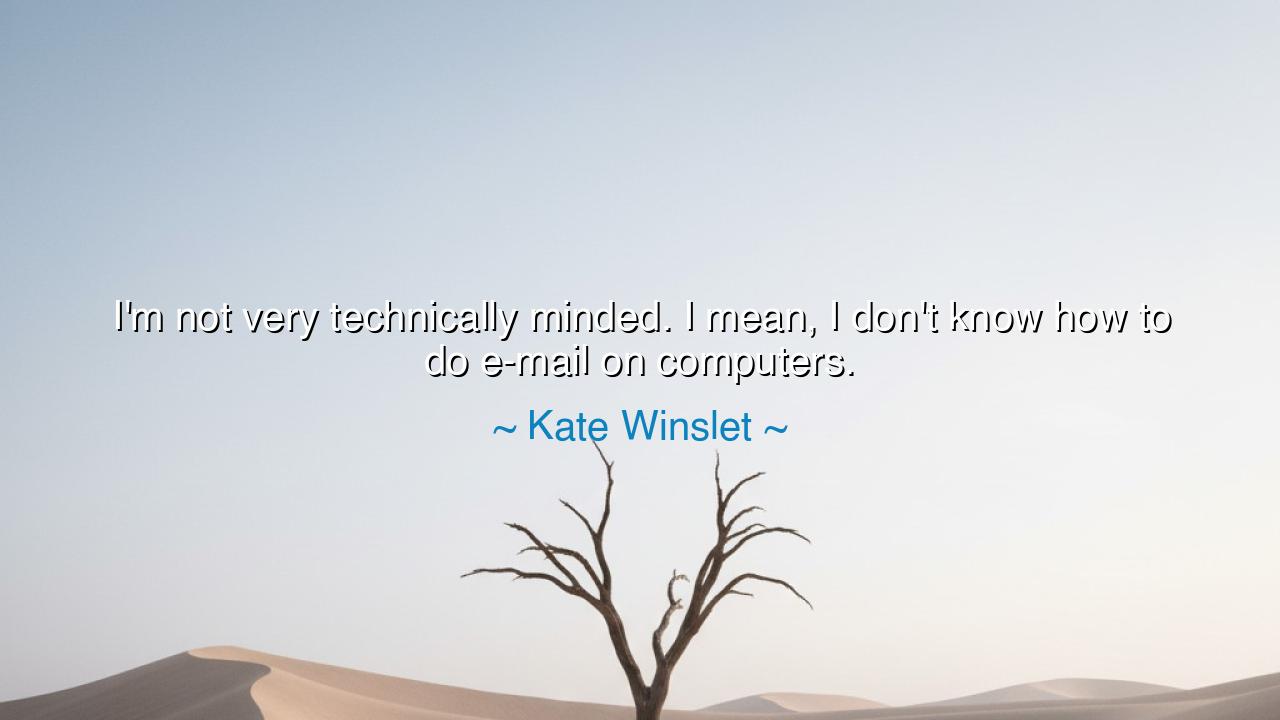
I'm not very technically minded. I mean, I don't know how to do






“I’m not very technically minded. I mean, I don’t know how to do e-mail on computers.” These words, spoken by the luminous Kate Winslet, might seem humble, even self-deprecating, yet within them lies a profound commentary on our relationship with technology, knowledge, and the pace at which our world has been changing. Winslet, celebrated for her artistry in film, speaks not of a lack of intelligence, but of a certain detachment from the modern tools that govern our day-to-day lives. In this simple declaration, she invites us to reflect on the balance between our human nature and the ever-expanding technological universe that surrounds us.
In ancient times, the wisdom of the elders was passed down through the spoken word, from generation to generation. The technologies of the ancients were often simple but profound—tools that were deeply integrated into the rhythm of life. The wheel, the plow, the sun dial—each was a powerful invention, not for its complexity, but for the way it harmonized with human existence. The very nature of these tools encouraged us to live more intentionally, to engage with our environment and our communities in ways that were meaningful. Yet today, we find ourselves immersed in an era where technology—much like the ancient wonders—has the power to transform our world, but its complexity often overwhelms us.
Winslet’s words reflect this tension—the quiet realization that, while technological advancement offers incredible opportunities, it can also create a barrier between us and the deeper, more human aspects of our existence. In an age where e-mail has become almost as essential as speech itself, there exists a subtle wisdom in acknowledging that not everyone will find their place in this digital landscape. To know how to write an e-mail does not guarantee that one understands the essence of communication, or the emotions behind the words. There are tools and systems in this world that are designed to streamline our lives, but in doing so, they often obscure the heart of what it means to be human.
Consider the ancient scribes, those who meticulously wrote down stories, laws, and histories long before the printing press. Their work was neither quick nor simple, but it carried a weight of meaning and purpose that connected each generation to the next. There was beauty in their labor, and an inherent wisdom in the act of writing by hand. In contrast, today, e-mail is a quick, often disconnected form of communication, so efficient yet so impersonal. We may find ourselves trapped in a world of rapid exchanges, where thoughts are conveyed in mere seconds but with little depth or reflection. Winslet's statement reflects this disconnect, this awareness that some forms of human engagement cannot be replicated in the electronic sphere.
The wisdom of the ancients tells us that simplicity often leads to the most profound forms of connection. In ancient cultures, when one sought knowledge, it was often through the voice of a teacher, the warmth of a mentor, or the quiet solitude of reflection in nature. Today, we have the tools to connect across vast distances—computers, phones, e-mails—but often, we feel more isolated than ever. Winslet, in her playful admission, asks us to remember that not all knowledge is technological in nature, and not all progress is measured by the speed at which we can send a message. There is something to be said for slowness, for stillness, for the ability to stop and reflect before engaging with the world.
In the story of Socrates, we see an ancient figure who, despite the development of new technologies in his time, remained rooted in the oral tradition. His dialogues with his students were not written down hastily or delivered through an e-mail; they were carefully considered, deeply philosophical exchanges that sought not only to transmit knowledge, but to understand the very nature of being. Today, we can send an e-mail in moments, but how often do we take the time to think deeply about what we say, to consider the meaning of our words before they are sent out into the world?
The lesson embedded in Winslet’s words is clear: we live in a time when technology moves at a pace that is often hard to keep up with. Yet in our rush to embrace these new tools, we must not lose sight of what makes us human—the ability to think deeply, to reflect, and to connect on a level that goes beyond mere information. The knowledge we seek is not always to be found in the quickness of technology, but in the depth of our experiences, our relationships, and our conversations.
To move forward, we must remember that balance is key. While embracing the tools of the modern age, we must also cultivate the ancient practices of reflection, deep thought, and connection. Just as Kate Winslet reminds us that not everyone needs to be a master of every modern technology, so too must we remind ourselves that it is the depth of our humanity, not the speed of our communication, that ultimately defines us. Let us take the time to be present, to listen and reflect, to engage in the ancient art of conversation—not simply through the click of a button, but through the fullness of our being. In this way, we will find a path forward that honors both the old wisdom and the new technology, finding a way to live well in both worlds.






AAdministratorAdministrator
Welcome, honored guests. Please leave a comment, we will respond soon